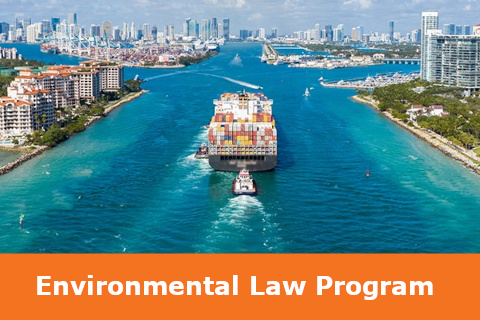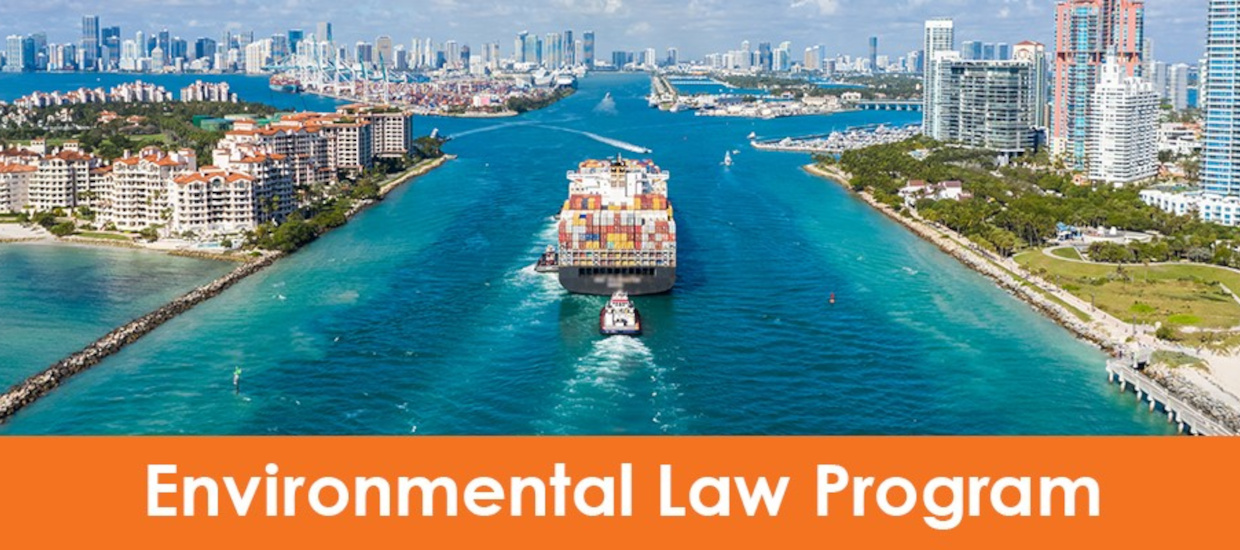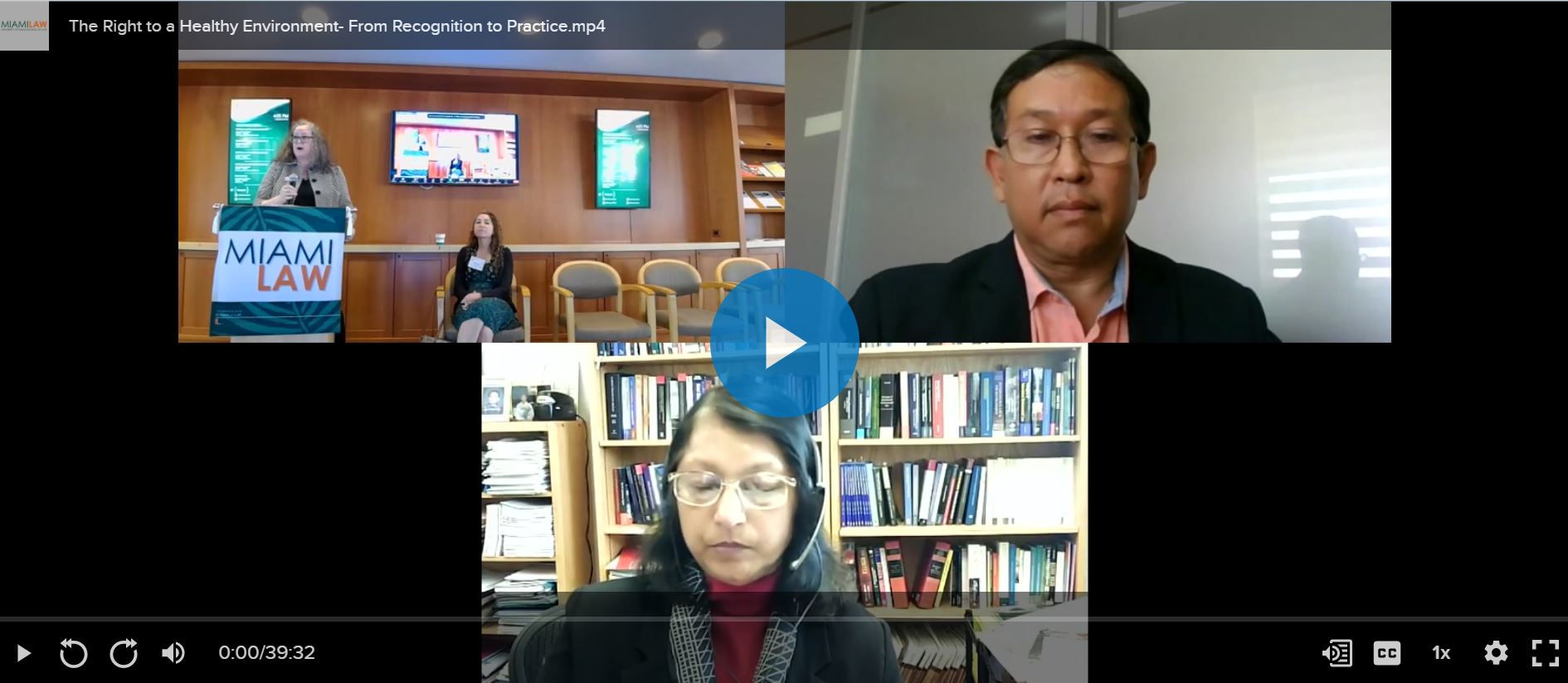2023 Past Events
"The Right to a Healthy Environment: From Recognition to Practice"
Thursday, February 23rd, 2023
After several years of pressure from advocates, the United Nations General Assembly recognized for the first time the human right to a clean, healthy, and sustainable environment in July 2022. Our distinguished panelists will discuss the fight to obtain the declaration and how recognition of a human right to a healthy environment will help with efforts to improve environmental conditions around the world. 2.5 CLE credits.
Panelists
Dr. Osvaldo Jordán Ramos,Staff Researcher, CIEPS
A researcher at the International Center for Political and Social Studies (CIEPS-AIP) located in the City of Knowledge, Republic of Panama. Dr Ramos has a doctorate in Political Science, master in Latin American Studies from the University of Florida, Gainesville, and a Bachelors Biology from the University of Panama and California State University, Chico. Expert in environmental policy and human rights, social movements, public participation and governance, and territoriality of indigenous and Afro-descendant populations in the Americas. He has taught courses at different universities and worked as a researcher, director and consultant in various public institutions, non-governmental organizations and international agencies such as the Water Center for the Humid Tropics of Latin America and the Caribbean (CATHALAC) and the Ramsar Regional Center for the Western Hemisphere (CREHO) focusing on the formulation of public policies for the management of protected areas, climate change adaptation, community participation and vulnerability reduction from a human rights perspective.
Smita Narula, Haub Distinguished Professor of International Law, Pace University School of Law
The Elisabeth Haub School of Law’s inaugural Haub Distinguished Chair of International Law and Co-Director of the law school’s Global Center for Environmental Legal Studies. Professor Narula teaches International Environmental Law, International Human Rights Law, Environmental Justice, Human Rights and the Environment, and Property. She is author of dozens of widely-cited publications on human rights, food systems, and the environment, and has helped formulate policy, legal, and community-led responses to a range of social justice and ecological issues worldwide. In 2021 she was elected as a Fellow in the American College of Environmental Lawyers. Prior to joining Haub Law School, Professor Narula was Associate Professor of Clinical Law at NYU School of Law. In 2008 she was appointed legal advisor to the U.N. Special Rapporteur on the Right to Food and served in this capacity for the duration of the Rapporteur’s six-year mandate. From 1997 to 2003, Professor Narula served as India researcher and Senior Researcher for South Asia at Human Rights Watch, and in 2000, she co-founded the International Dalit Solidarity Network, a transnational advocacy network that helps advance the right to equality for 260 million people affected by caste-based discrimination worldwide.
Daniel Magraw, Senior Fellow, Johns Hopkins University SAIS and Visiting Professor, University of Miami School of Law
A Fellow at the Foreign Policy Institute at Johns Hopkins School of Advanced International Studies (SAIS) and President Emeritus at the Center for International Environmental Law (CIEL). He has extensive experience in international law, institutions, processes and policies, particularly relating to environmental protection and human rights, including having worked in government, non-governmental organizations (NGOs), inter-governmental organizations, business, and academia. Professor Magraw was President and Chief Executive Officer of CIEL from January 2002 to September 2010, during which time he also worked on substantive projects, including climate change, international financial institutions, toxic chemicals, oceans, democratizing international dispute settlement, trade and environment, and the law of foreign investment. He continues to work on substantive matters at CIEL as President Emeritus. He represents India in an arbitration brought by Pakistan under the Indus Waters Treaty, was for many years a member of the U.S. government's Trade and Environment Policy Advisory Committee (TEPAC), chairs the American Bar Association (ABA) Section of International Law's Task Force on Magna Carta, serves as a consultant to the United Nations, and is on the Board of Directors of Lightbridge Corporation, a publicly traded company.
Nadia Ahmad, Associate Professor of Law, Barry University
Her research and scholarship center on the intersections of energy siting, the environment, and sustainable development, drawing on international investment law and corporate social responsibility. She has spent her academic career focusing on frontline communities who are the most vulnerable to energy production and climate change. Previously, she was a Visiting Associate Professor at Yale Law School and the inaugural Visiting Assistant Professor of Environmental Law at Pace Law School. In addition, she is a Fellow of the American Bar Foundation, Council Member of the American Bar Association’s Section of Civil Rights and Social Justice, and a member of the Academic Advisory Group for the International Bar Association’s Section of Energy, Environment, Natural Resources, and Infrastructure Law. Previously, she earned an undergraduate degree in Comparative Literature from the University of California at Berkeley, a law degree (J.D.) from the University of Florida Levin College of Law, and a masters of law (LL.M.) in Environmental and Natural Resources Law from the University of Denver Sturm College of Law.
Sumudu Atapattu, Director, Global Legal Studies Center, University of Wisconsin Law School
LM, PhD (Cambridge), Attorney-at-law (Sri Lanka) is Teaching Professor and Director of the Global Legal Studies Center at University of Wisconsin Law School. She is affiliated with UW-Madison's Nelson Institute for Environmental Studies, Global Health Institute, the Center for South Asia, and the 4W Initiative, and is the Executive Director of the Human Rights Program. She is also the Lead Counsel for Human Rights at the Center for International Sustainable Development Law; and affiliated faculty at the Raoul Wallenberg Institute for Human Rights, Sweden. She has published widely including several books on climate change and human rights, international environmental law, and environmental justice. Before moving to the USA, she was an associate professor at Faculty of Law, University of Colombo, Sri Lanka, and a consultant to the Law & Society Trust, Colombo.
University of Miami Co-Sponsors
Abess Center for Ecosystem Science & Policy
Environmental Law Program
Environmental Law Society
Global and International Law Program
HOPE Public Interest Resource Center
Human Rights Program
Human Rights Society
Native American and Global Indigenous Studies






